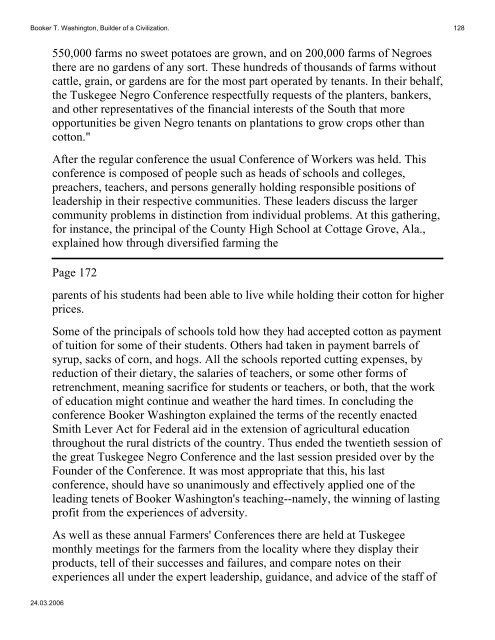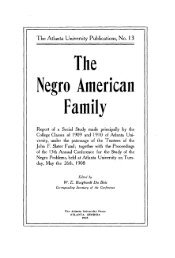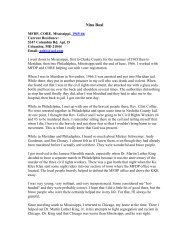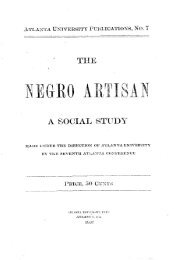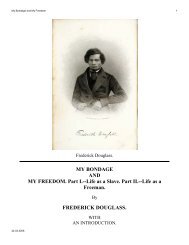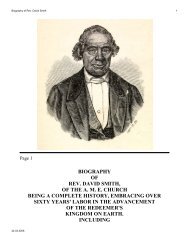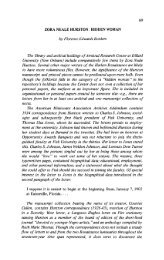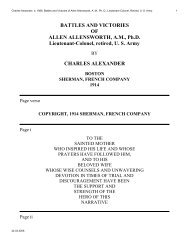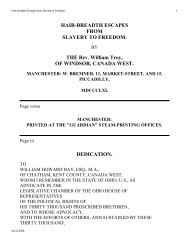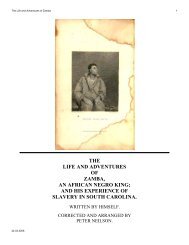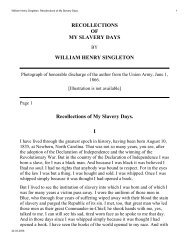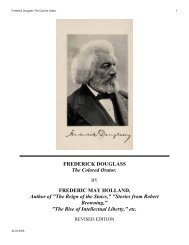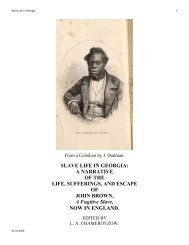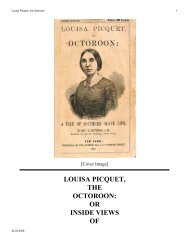Booker T. Washington, Builder o - African American History
Booker T. Washington, Builder o - African American History
Booker T. Washington, Builder o - African American History
Create successful ePaper yourself
Turn your PDF publications into a flip-book with our unique Google optimized e-Paper software.
<strong>Booker</strong> T. <strong>Washington</strong>, <strong>Builder</strong> of a Civilization. 128<br />
550,000 farms no sweet potatoes are grown, and on 200,000 farms of Negroes<br />
there are no gardens of any sort. These hundreds of thousands of farms without<br />
cattle, grain, or gardens are for the most part operated by tenants. In their behalf,<br />
the Tuskegee Negro Conference respectfully requests of the planters, bankers,<br />
and other representatives of the financial interests of the South that more<br />
opportunities be given Negro tenants on plantations to grow crops other than<br />
cotton."<br />
After the regular conference the usual Conference of Workers was held. This<br />
conference is composed of people such as heads of schools and colleges,<br />
preachers, teachers, and persons generally holding responsible positions of<br />
leadership in their respective communities. These leaders discuss the larger<br />
community problems in distinction from individual problems. At this gathering,<br />
for instance, the principal of the County High School at Cottage Grove, Ala.,<br />
explained how through diversified farming the<br />
Page 172<br />
parents of his students had been able to live while holding their cotton for higher<br />
prices.<br />
Some of the principals of schools told how they had accepted cotton as payment<br />
of tuition for some of their students. Others had taken in payment barrels of<br />
syrup, sacks of corn, and hogs. All the schools reported cutting expenses, by<br />
reduction of their dietary, the salaries of teachers, or some other forms of<br />
retrenchment, meaning sacrifice for students or teachers, or both, that the work<br />
of education might continue and weather the hard times. In concluding the<br />
conference <strong>Booker</strong> <strong>Washington</strong> explained the terms of the recently enacted<br />
Smith Lever Act for Federal aid in the extension of agricultural education<br />
throughout the rural districts of the country. Thus ended the twentieth session of<br />
the great Tuskegee Negro Conference and the last session presided over by the<br />
Founder of the Conference. It was most appropriate that this, his last<br />
conference, should have so unanimously and effectively applied one of the<br />
leading tenets of <strong>Booker</strong> <strong>Washington</strong>'s teaching--namely, the winning of lasting<br />
profit from the experiences of adversity.<br />
As well as these annual Farmers' Conferences there are held at Tuskegee<br />
monthly meetings for the farmers from the locality where they display their<br />
products, tell of their successes and failures, and compare notes on their<br />
experiences all under the expert leadership, guidance, and advice of the staff of<br />
24.03.2006


